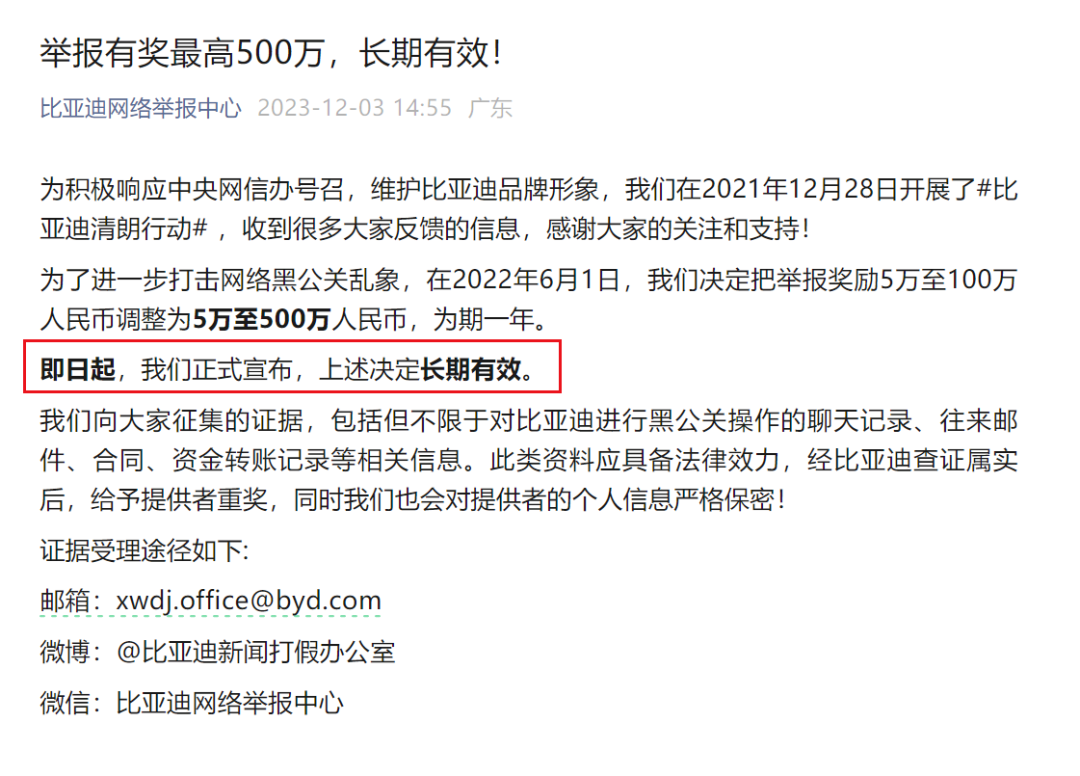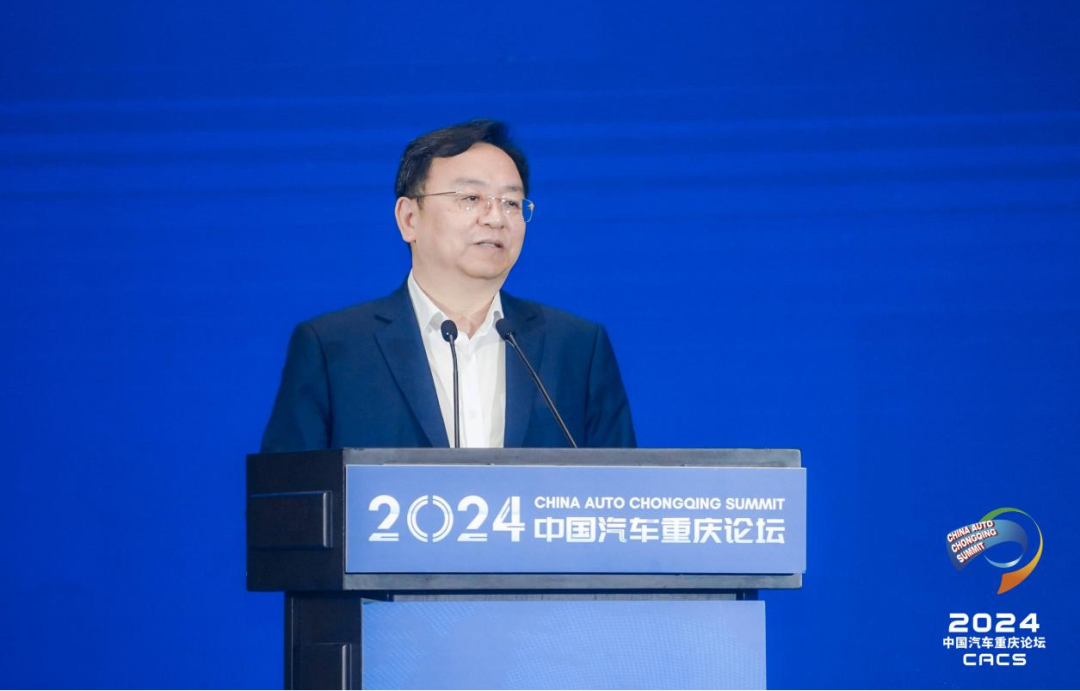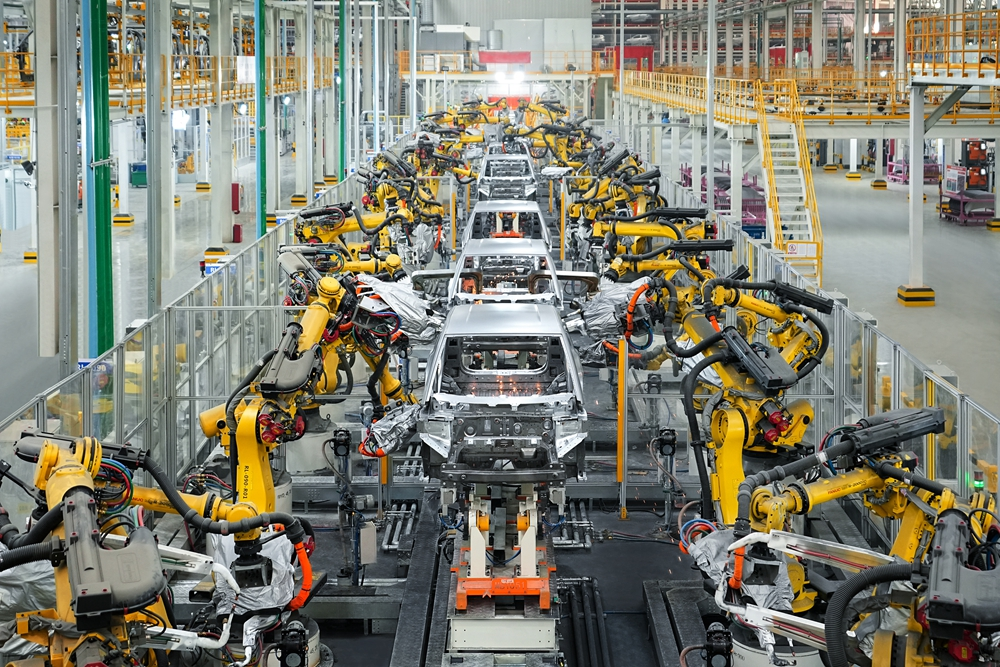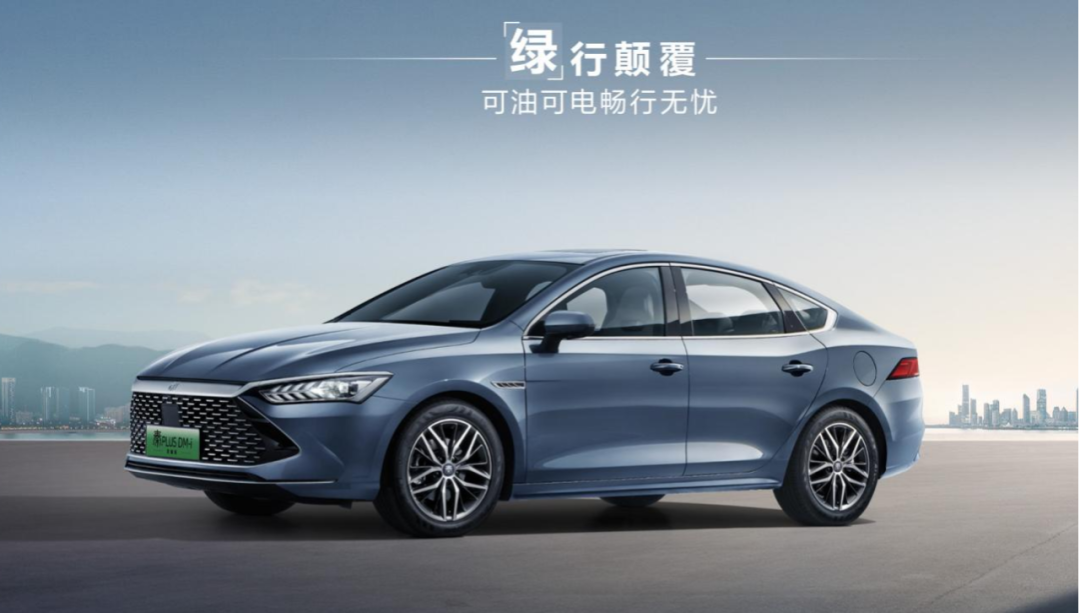Who Is "Envious" of BYD?
![]() 06/26 2024
06/26 2024
![]() 684
684

Author: Lu Shiming
Editor: Da Feng
As competition intensifies, strange phenomena in the automotive industry are becoming more severe.
Not long ago, Li Yunfei, General Manager of BYD Group's Brand and Public Relations Department, stated that a certain automaker was using black PR tactics to belittle, discredit, and maliciously defame BYD's brand and products. BYD will collect effective clues and evidence of black PR and reward providers of valid clues and evidence with 200,000 to 5 million yuan.
In fact, this is not the first time that BYD has combated online "black PR" with a large reward.
As early as December 2021, BYD launched the "BYD Clean Action" and set the reward amount at 50,000 to 1 million yuan. On June 1, 2022, BYD announced that it would increase the reward for reporting to 50,000 to 5 million yuan for one year. On December 3, 2023, BYD announced again that the maximum reward for reporting black PR is 5 million yuan, which is long-term valid.

Source: BYD Online Reporting Center
Cases of "black PR" in the automotive industry are not uncommon and have been repeatedly brought up by various automakers and brand founders for complaint. Even though automakers have spontaneously formed alliances specifically targeting black PR, under the drive of interests, the effectiveness of the "anti-black PR alliance" has been minimal.
Nowadays, China's new energy vehicles are at an excellent opportunity for overtaking, and black PR not only harms those enterprises that focus on products and technology but also undermines the innovation momentum of the entire industry, hindering the rapid development of China's automobiles.
BYD's move to collect black PR evidence and clues through rewards may have a deterrent effect on black PR chaos in all industries. However, to truly create a fair and just market environment, the self-consciousness of all participants is needed.
Who Is "Dissing" BYD?
After BYD once again offered a significant reward for "black PR" clues, it quickly attracted widespread attention. One of the most curious points was which automaker Li Yunfei referred to as "a certain automaker".
Without sufficient evidence, I dare not speculate. However, it is worth noting that there are not many automakers that have had some "disagreements" with BYD.
Recently, there was a "verbal battle" between the leaders of GAC and BYD.
At the 2024 China Auto Forum held in Chongqing, GAC Chairman Zeng Qinghong severely criticized the industry's price war and said: "We have laid off many people, and this kind of vicious competition is not a solution. The purpose of a company is to make a profit, and only after making a profit can we contribute to the country and society. We should have a broad perspective and a long-term strategic vision, rather than focusing on short-term gains."
Regarding Zeng Qinghong's statement, BYD's Chairman Wang Chuanfu completely disagreed.
Wang Chuanfu believes that the so-called "vicious competition" is just a natural state of competition in a market economy. Technological innovation, price competition, and scale expansion are all essential paths for a company's growth. We should not be afraid of competition but embrace it and become stronger in the competition. Only in this way can we create a world-class brand and make a greater contribution to the country.

Wang Chuanfu Source: 2024 China Auto Forum in Chongqing
These two diametrically opposed voices sparked a flurry of discussion. Some netizens supported GAC's conservative strategy, believing that blind competition would only lead to a vicious cycle. However, more voices tend to favor BYD's aggressive attitude, believing that only continuous self-surpassing can secure a place in the international market.
In fact, compared to the "conflict" between Great Wall and BYD, the "subtle rivalry" between GAC and BYD is relatively mild.
Last May, Great Wall issued a statement alleging that two popular models from BYD, the Qin PLUS DM-i and the Song PLUS DM-i, had emissions issues that did not meet standards and reported them to relevant departments. BYD responded that the test vehicles did not strictly meet the national standard requirements for inspection, and Great Wall could not use this as a basis. BYD firmly opposed any form of unfair competition and reserved the right to take legal action!
This incident thoroughly strained the relationship between the two automakers, to the extent that the recent launch of the new Haval H6 became an unprecedented "DISS" BYD conference.
At the launch, Li Ruifeng, Chief Growth Officer (CGO) of Great Wall Motor, said:
If prices are rolled down below cost, even with the guise of technology, the commercial essence of low prices and low quality will not change. In places invisible to consumers, chassis structures are shrunk, energy-absorbing boxes are canceled, and uncoated and non-corrosion-resistant steel plates are used as substitutes, ultimately harming consumer interests. Some companies have doubled the statutory three-year warranty cost per vehicle internally in their publicly listed financial reports in just two years. The mystery behind this is worth pondering...

Source: New Haval H6 Launch
Regarding Li Ruifeng's remarks, many netizens believe that new car launch audiences want to see new technologies, new science and technology, performance improvements, and prices rather than constantly "connotating" competitors. Other netizens said, "Can't we have less grievances and anger? Focus on doing our own products well, technology is the core."
Why Can BYD "Cut Off Other's Financial Sources"?
Black PR is essentially a low-level tactic imposed by "losers" on "winners" between automakers. The reason why BYD frequently encounters black PR and becomes the target of attacks is simple: its sales are too good and its development is too fast.
In 2023, BYD's sales reached 3.0244 million vehicles, a year-on-year increase of 61.86%, with a net increase of about 1.16 million vehicles, accounting for over 44% of the net growth in domestic new energy vehicle sales. Looking back further, BYD's 2022 sales were 1.5831 million vehicles, with a year-on-year growth rate of 200% and a market share of up to 30.2%.
An increase in market share of 14% in one year is astonishing and makes other automakers "envy" BYD.
As the saying goes, "Cutting off someone's financial source is like killing their parents." BYD's rapid growth in market share means a decline in the market share of other automakers and a cliff-like drop in their revenues. Under the fact that BYD has damaged the interests of too many peers, BYD is bound to be targeted.
However, another saying goes, "A straight body fears no crooked shadows." BYD's victory in the price war and unprecedented achievements rely not on "black PR" but on its solid strength of compressing costs to the extreme.
BYD has always been committed to building a full-industry-chain industrial conglomerate, meaning that everything it can manufacture itself is never bought from outside at a high price.
For example, BYD's Fudi Battery supplies BYD itself, theoretically achieving zero gross margin for internal settlement prices, while CATL's overall gross margin exceeds 20%. This means that BYD can save tens of yuan per kilowatt-hour of electricity compared to other automakers.

BYD New Energy Passenger Car Factory Source: BYD Official Website
By mastering core technologies and self-researching and producing components, BYD's production costs continue to decline, and sales volumes continue to rise due to price advantages. The economies of scale brought by sales volumes can further compress costs, creating a virtuous cycle that is the core reason for BYD's rapid rise and growth in recent years.
The key is that other automakers' own economies of scale and industrial chain costs are difficult to match BYD's costs. If they follow suit in the price war, they will basically face continuous losses.
Therefore, some automakers may adopt the mindset of "solving problems within the chessboard through means outside the chessboard" and suppress BYD through "black PR," as public opinion wars can also be a powerful weapon when utilized correctly.
However, as a "victim," BYD has shown great wisdom. BYD not only deters its opponents through "hefty rewards" but also shares its "firepower" by "luring" competitors.
Li Yunfei once said, "We hope that Chery can not only become the second-largest Chinese new energy automaker but also get closer to BYD, the closer the better, so that they can help us share some of the 'firepower.'" Interestingly, in March of this year, Chery Chairman Yin Tongyue publicly expressed his hope that Chery would see BYD's back and become the second-largest Chinese automaker in the next two years.
Rolling on Prices, Rolling on Value, Rolling Out Consumer Recognition
The chaos of black PR does not only occur in the current automotive industry. It is also a headache for manufacturers in the competition in the domestic mobile phone market.
After the launch of Xiaomi 14 last year, Lei Jun suddenly reposted an unusual Weibo post.
The original Weibo post roughly stated that someone was targeting Xiaomi users, collecting "videos of Xiaomi phones lagging," and providing an APP tool that could occupy users' phone memory after downloading, causing the phone to lag. Xiaomi users could record their lagging phones and post the videos online to earn 50 yuan per video.
Although the phenomenon of "black PR" in the mobile phone industry still exists, it has improved a lot compared to years ago.
Nowadays, when mobile phone manufacturers compare themselves with other brands, they will not only talk about the areas where their competitors cannot match but also praise their competitors' strengths. And they often unanimously target Apple or Samsung as their competitors.
Undoubtedly, the automotive industry needs such healthy competition.
Since new energy vehicles entered the mature stage, the brutal elimination race has intensified, with big fish eating small fish and fast fish eating slow fish. The trend of resource integration in the entire automotive industry is becoming increasingly apparent. Especially after the launch of BYD's 79,800 yuan Qin Glory Edition, many automakers have no way out.

BYD Qin Plus Dm-i Glory Edition Source: BYD Official Website
Following suit means dying slowly, while not following suit means dying faster. Currently, there are over 200 domestic automotive brands, and it is expected that in 3 to 5 years, there will be less than 20 left, with about 70% of automotive brands being eliminated.
Standing on the eve of such a predictable outcome, how to "roll" correctly? The answer to this question depends on the situation.
If you only roll on prices and not on technology, it is meaningless. This is similar to the "burn money model" of the internet, where ultimately only the capital strength behind it matters. But if you roll on prices based on value, from the consumer's perspective, no matter how you roll, it is beneficial.
As participants, automakers should now focus on using good technology, good products, and good prices to win more consumer recognition. Because when consumers recognize you, they will naturally speak for you, which is more powerful than any competitive means.






